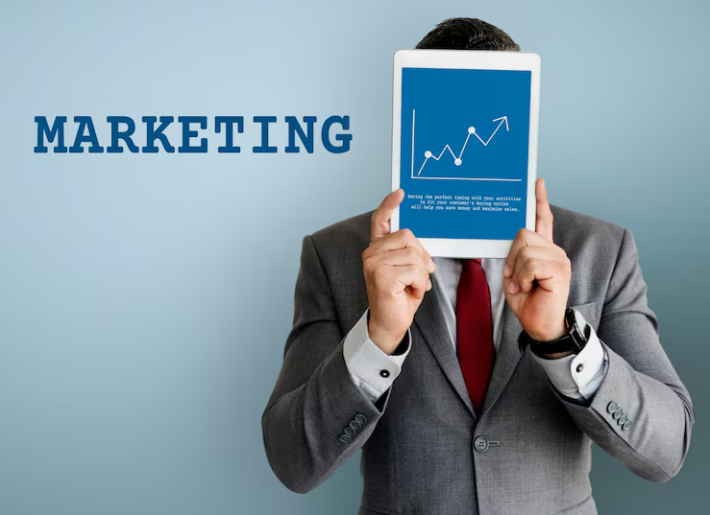Content marketing has changed for good, and it’s all because of Artificial Intelligence. Stories abound of marketers pushing out more content than they’ve ever done in short timeframes.
Although Generative AI tools are far from perfect, they are only getting better. And their impact is felt in critical stages of the content marketing process.
In this post, I outline 6 areas GenAI is affecting to keep you up to speed.
We’ll discuss:
- AI Brainstorming
- AI content creation
- AI personalization
- Optimizing content for voice search
- Content performance analysis
- AI-powered visuals
1. AI Brainstorming
One of the most challenging aspects of content marketing is consistently coming up with fresh and relevant content ideas. Traditionally, this process involves extensive research and brainstorming sessions.
Fortunately, AI is now stepping in to simplify and enhance this process. According to the 2023 State of Marketing AI Report, 71% of marketers already use AI tools for content optimization and planning.
AI automation tools can analyze vast amounts of data, including current trends, audience behavior, and competitor content, to suggest topics likely to resonate with the target audience.
AI tools can scan social media platforms, forums, and search engines to identify trending topics and emerging themes. They analyze keywords and search queries to uncover content gaps, providing marketers with opportunities to create unique and valuable content.
2. AI Content Creation
AI-powered content creation tools such as Stealthly have seen significant advancements recently. These tools can now generate various types of content, such as blog posts, social media updates, and video scripts. For instance, GPT-4o, a cutting-edge language model, can create text that closely resembles human writing based on a few input prompts.
AI-generated content can significantly improve efficiency and scalability. According to a recent Semrush report, 44% of businesses using AI for content creation have seen a significant increase in productivity.
However, there are concerns about the originality and personal touch of AI-generated content. Critics argue that AI lacks the creativity and emotional depth human writers bring.
Despite these concerns, AI can be a useful complement to human efforts when used responsibly. It can handle routine content tasks, allowing human creators to focus on more complex and creative work.
Combining the strengths of both AI and human creativity lets businesses produce high-quality content more efficiently while maintaining the unique touch that resonates with audiences. This balanced approach can lead to better engagement, increased conversion, and overall success in content marketing.
3. AI Personalization
A recent Dynata study found that 75% of consumers are more likely to purchase when brands offer personalized experiences.
AI-powered personalization is key to effective content marketing. In 2024, AI will enhance this aspect by analyzing user data and preferences to deliver highly personalized content experiences.
AI algorithms can segment audiences based on various parameters, such as demographics, behavior, and past interactions, and tailor content to match these segments.
Personalized content marketing has increased engagement, conversions, and customer satisfaction.
4. Optimizing Content for Voice Search
Voice search is becoming more popular. According to a 2022 Juniper Research study, there will be 8.4 billion digital voice assistants in use by 2024, up from 4.2 billion in 2020.
Voice search fundamentally alters content consumption habits, especially with the rise of smart devices like speakers and virtual assistants. These platforms encourage users to phrase queries in natural language rather than relying on succinct keywords.
For instance, a nursing student searching for affordable nursing degree programs might ask, "What's the cheapest RN to BSN online?" This shift demands that marketers optimize content to align with these conversational queries.
AI-driven tools are pivotal in this optimization process. They analyze how people phrase voice searches and assist in crafting content that resonates with these patterns.
Marketers can enhance their visibility by adopting a conversational tone and structuring content in a Q&A format that directly addresses common voice search queries. This strategy not only boosts accessibility but also caters to an audience increasingly reliant on voice commands for information retrieval.
5. Content Performance Analysis
A 2023 Segment study found that 60% of businesses saw a significant increase in customer satisfaction scores after implementing AI-powered personalization strategies.
AI marketing tools can pinpoint high-performing content elements, such as specific topics, formats, and distribution channels. This allows marketers to replicate and enhance these successful strategies.
For example, AI can analyze which blog posts generate the most traffic or which social media posts get the most engagement, helping marketers focus their efforts where it matters most.
6. AI-Powered Visuals and Video Marketing
Visual content is becoming more important in marketing strategies. AI-powered tools can now generate images, infographics, and short videos based on text descriptions. An AI Image Enhancer tool allows marketers to refine and optimize visuals effortlessly, ensuring high-quality images that align with brand aesthetics while saving time on manual editing. For example, AI can create custom graphics that match a brand's style or generate videos that summarize long-form content.
AI helps you automate video editing tasks like caption generation and AI video summarization, helping marketers save time while maintaining quality. This makes video production faster and more efficient. As short-form video content becomes more popular, these AI tools can also help marketers to repurpose long videos into multiple shorter clips in no time and effort. According to a recent Cisco report, 82% of all internet traffic will be video by 2024..
Using AI for visual and video content helps marketers keep up with the demand for high-quality visuals. It allows them to create engaging content without spending too much time or resources.

Finally, Ethical Considerations
As AI becomes more ingrained in content marketing, ethical considerations loom larger.
According to a recent Edelman Trust Barometer report, 81% of consumers believe businesses must be transparent about how AI is used to influence their decisions.
- AI-generated content must remain unbiased and transparent to uphold audience trust. This requires regular audits of AI tools and datasets to detect and mitigate biases that might impact the content produced.
- Human oversight and editorial control play pivotal roles in AI-driven content creation. Marketers must guarantee that AI- generated content meets stringent quality benchmarks and adheres to brand values.
- Transparency is equally vital—audiences deserve clarity whenever the content is AI-generated or significantly influenced by AI. Upholding these ethical standards fosters trust in an era increasingly shaped by AI.
As long as marketing teams continue to prioritize their readers by following the AI ethics, they will have no qualms adopting GenAI into their workflow.


 Table of Content
Table of Content










